TV Core-ner Review, “Love” – First Season (10 Episodes)
Overall Rating: *** 1/2 stars (out of ****)
Released February 19, 2016
Created by Judd Apatow, Lesley Arfin, Paul Rust
Written by Apatow, Arfin, Rust, Brent Forrester, Dave King, Alexandra Rushfield, Ali Waller
Cinematography by Daniel Mindel
Starring Gillian Jacobs, Rust, Claudia O’Doherty
Running Time: 27-37 minutes per episode
In the first episode of “Love,” the new long-7form Netflix dramedy from the Judd Apatow Factory, Mickey (Gillian Jacobs) gets up onstage at a weird, makeshift church, wearing a one-piece under jeans. She blurts out that she’s on Ambien, then reminds the audience that she’s wearing a one-piece under jeans. This was one of the first things that endeared me to her. She took a weird situation and managed to make it weirder, so we have that in common.
Jacobs delivers these lines with a mix of blasé, deadpan realness and emotional exhaustion. Re: the topic of love, which seems to be what all these aging hippies are celebrating, she says: “I’ve been asking and asking, and I haven’t gotten fucking anything.” In fact, for Mickey, “hoping for love has fucking ruined my life.”
She’s not alone, despite feeling it. Especially for women in our society, to be on the receiving end of romantic love is upheld as a Holy Grail of personal achievement. And because we’re conditioned to be passive receivers, “waiting and wishing and wanting,” some of us are willing to settle for lame, false love.
Many of us will experience false love at least once in our lifetimes; others may be perpetually sucked into it. Those of us who linger in these unfulfilling relationships are often masochists, and can wind up hurting others, too. I like to call this group “hurricane people.”
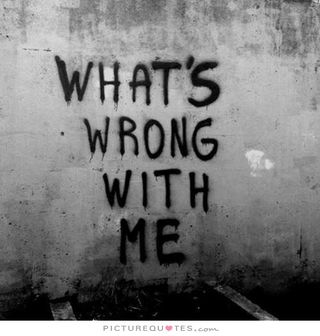
For hurricane people, self-shaming is a habit. As Girls’ Hannah Horvath once said, “No one could ever hate me as much as I hate myself, okay? So any mean thing someone is going to think of to say about me, I’ve already said to me, about me, probably in the last half-hour.”
Hurricane people are self-destructive and outwardly destructive, easily influenced, and often have addictive or impulsive personalities. They will uncontrollably binge on drugs, shopping, gambling, or even people. This makes them prone to become serial daters. If you’ve ever been a serial dater (like me from late 2012-late 2015… guilty as charged), and like Mickey, once one relationship ends, you leap into another. It may not feel intentional, but it seems like every time you get to the end of one relationship, there’s another person there to escape into. Until there isn’t, and for the first time in a while, you have to deal with yourself.
From the jump, “Love”‘s Mickey and Gus (Paul Rust) are suddenly forced into this confrontation of self, each emerging from a bad relationship. The show’s name and cute, bubbly cartoon intro are deliberately misleading, designed to draw you in so that you may discover its deeper, darker truths. The subtext of Apatow’s latest masterpiece is that the hunt for love from another person is damaging; self-love, self-reflection, and self-respect are essential for us to grow, heal, and yes–really love.
Apatow’s big-hearted, relatable humor is characteristic of nearly all his work, but somehow “Love” still feels new and vital for a generation of people who don’t love themselves very much. There are plenty of other shows out about the dating debacles of twenty-somethings–“Cooper Barrett’s Guide to Surviving Life” comes to mind–but the humor of the aforementioned feels canned, and some of its main characters just come across as vapid, rich, overgroomed jerks.
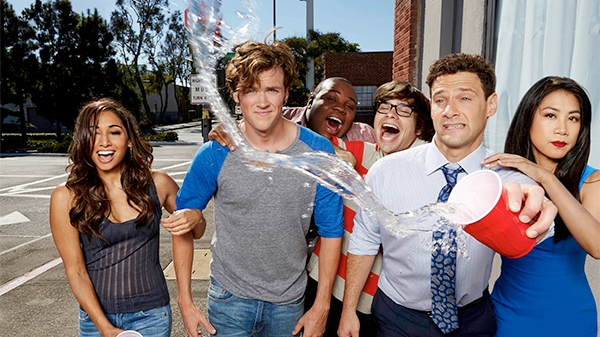
The four people in the foreground look like they got too drunk during happy hour at a bougie restaurant in the business district, and that may be my least favorite type of person.
So while the outer layer of “Love” is about an unlikely couple falling for each other–because let’s be fair, Mickey is waaay hotter than Gus–its inner core is about self-love. Here are a few examples.
- Mickey dates way down, and it’s a direct reflection of how she feels about herself. Mickey is a hurricane woman: flailing, raging, destroying things faster than she even realizes, but with a gaping hole in the center. And it’s not a peaceful one; it’s one she’s constantly trying to fill with unhealthy distractions. She blows through tumultuous relationships with gross addicts, and battles her own substance addictions (one of the show’s most heartbreaking onscreen moments is watching Mickey absorb crushing defeat as she resets the “Days Sober” tracker on her phone). She doesn’t have any concept of stability or self-control–chasing desperately after Gus and even showing up at his work; doing hallucinogens with a guy she met that night (a hilarious Andy Dick) and riding the subway. She’s got a decent managerial job working for the symbolically named “Dr. Greg’s ‘Heart Work'” radio show, but it’s one of the only areas in her life where has any semblance of control or structure.
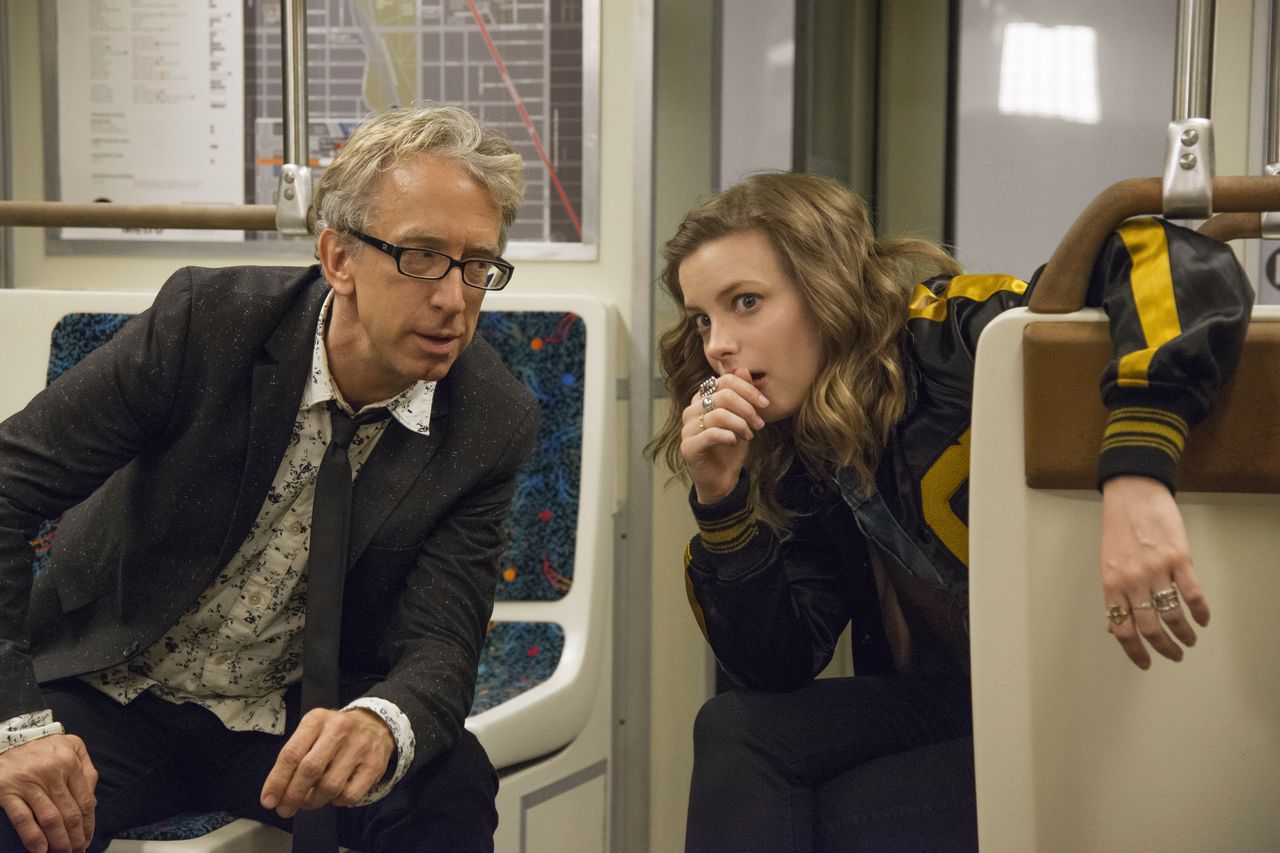
“Can I make an announcement to pe–everybody? Basically, we’re on drugs, and it would help us if nobody looked at us.”
Her ex, Eric (Kyle Kinane), is probably the greatest testament to Mickey’s lack of self-respect. Eric is a super-lame, scummy, overgrown adolescent who, Mickey theorizes, “loved cocaine more than he loved me.” When Mickey looks at him, we register her pure disgust, as well as her sick dependence on him–for example, she jumps out of bed, high on Ambien, as soon as he texts her to come see him at “Bliss House.” She lets him back in to her apartment more than once to sleep with him, out of boredom and a craving for intimacy. While Eric is sidelined early on in the show, his presence in her life at all speaks to a history of poor decisions, rooted in her crappy self-image.
Unfortunately, her behavior over the last few years has left more than a few tropical towns flattened in her wake. We meet another ex when the two run into each other at a party; he lays into her mercilessly, accusing her of ruining his life.
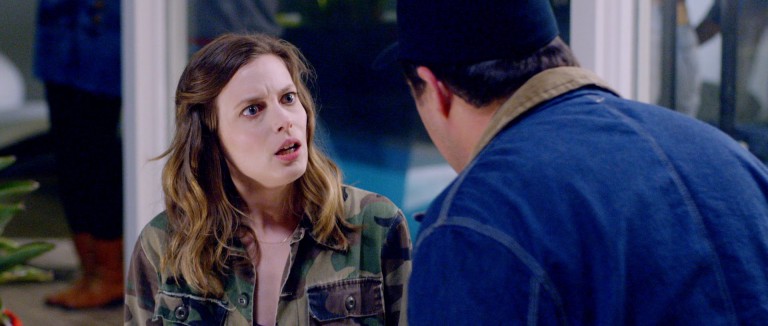
In a brilliant, subtle choice by costume designer Jennifer Eve, Mickey’s camo jacket foretells this verbally violent smackdown.
Mickey wants to sweep the past under the rug and make speedy amends, but he’s insistent on reminding her of the havoc she wreaked. “I’ve spent thousands of dollars on therapy because of you,” he snaps. “You destroy everything you touch.” She gets defensive, but she’s clearly hurt, and immediately triggered. She grabs a bottle of vodka inside and breaks a long bout of sobriety.
Mindless, post-traumatic binging is one way she and so many other troubled people attempt to escape their inner demons. By binging, she temporarily shoves these demons in the closet, like clutter to deal with later. As Dr. Greg (Brett Gelman) later passive-aggressively warns her, if she doesn’t face those demons and continues to binge on people, she will continue to fuck up relationships with them, not to mention make horrible choices in people in the first place. Tragically, she’ll keep screwing herself over, and never truly evolve. Dr. Greg may be a slimy douchebag, but he’s right on this front.
2. Gus is a pushover at work and a doormat in relationships, but is happiest and “himself” around his friends. Overall, Gus doesn’t respect himself much, either. He’s obnoxiously “fake nice” and out-of-touch in his relationship with grouchy, basic-B Natalie (Milana Vayntrub). On a daily basis, he has no idea how to say “no” to spoiled child star Aria (the precocious Iris Apatow), whom he tutors on set of the low-brow cable network show, “Witchita.” His intimidating, hard-nosed boss Susan (Tracie Thoms) is the perfect foil to expose his submissive nature.
Still, Gus has one zone of life where he’s happy, respected, and secure, and that’s *drum roll* the friend zone.
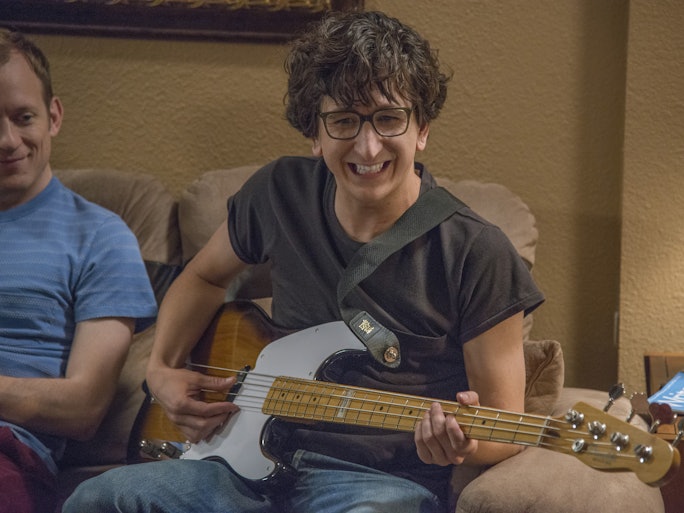
When I first heard Gus’s friends skillfully harmonize on the “Perfect Storm” ditty, I thought it was a real song. Is that really dumb?
He’s creative, goofy, and full of energy around his friends. They accept him for who he is, encourage his talents, and make him feel special and important. This is one of the show’s more realistic scenarios; while Judd Apatow can wax implausible and exaggerated, he can also masterfully portray the nuances of everyday social dynamics, so much that it feels like we’re just watching our own friend group hang out on screen.
It makes sense that Gus is most himself around his eclectic buddies, and it also checks out that he’s (endearingly) not himself around women he’s interested in. After all, the frustrating fact is that in the early stages of getting to know a romantic interest, we neurotics can act weird, psych ourselves out about text messages and facial microexpressions, and sabotage things before they even really start.
But having meaningful, strong bonds with friends we can be ourselves around, and who love us unconditionally, is awesome, especially after a soul/self-sucking breakup.
Good friends are underrated. I think it should be legal to get friend-married.

Ughhhhhh.
3. Gus and Mickey aren’t really that compatible, and have already had a very rocky “relationship” by the end of Season 1–leaving their future together pretty ambiguous. No good TV series these days has just one dimension to it–and this scene is where the self-love undertones get drowned out. For me, Gus interrupting the contemplative Mickey (for once!) with a passionate kiss was very frustrating. “I think I just need to be by myself for maybe, like, a year,” Mickey had said, blurting out a hard truth–and a boundary, which Gus immediately disrespected. And that kiss would ruin anyone’s soul-searching plans, let alone the easily-swayed Mickey. Hormones are powerful, man.
One major, glaring strike against the likelihood of a Gus-Mickey relationship is that they’ve shown themselves to be very different people. It’s been proven that people in the happiest relationships would say they have wound up with people like them. However, the kiss made sense–for now. Gus and Mickey are each other’s kryptonite, for some unknown reason. They continually gravitate toward one another out of vulnerability and curiosity, despite creating stress and conflict in each other’s lives. Mickey is intrigued by Gus’s healthy social life and “good person” appeal–as we can see from her clicking longingly through his Facebook profile pictures–so we know that deep down, a healthy part of her is attracted to his good heart. She wants to be a part of his world, even as she belittles and bucks against it (and makes an awful first impression on his friends). She longs for a guy who isn’t abusive to her, who brings out the good in her, and Gus seems like he could be that guy. Gus, meanwhile, has already gained some backbone in the workplace, and it’s all happened post-Mickey.

Gus’s tantrum in the writer’s room reads as a result of his bottled-up frustration at his own passivity–basically, he couldn’t be “fake nice” anymore–so it’s more aggressively awkward and annoying than it is refreshing (hey, we can’t always root for the main characters).
However, I’m convinced that Apatow will complicate the story as much as possible, and show us how much “heart work” Mickey and Gus have to do individually before they’re truly ready for each other, if they ever are. At season’s end, their lives are both at a crossroads. It’d definitely be beneficial for each of them to not blindly dive into dating each other, but it’s possible that they can empower each other, too, and help each other through the work. My hope is that no matter what happens, by “Love”‘s conclusion, they each love and understand themselves better. This time–maybe this time–it may not all end in tears.
We shall see in 2017, when Season 2 hits da ‘Flix (my new cool way of saying something is gonna stream on Netflix). In the meantime, I think it’s important for us to meditate on the many profound teachings within the story of “Love,” namely: love thyself to truly love another well.
Also, to you desperate single souls: get off Tinder and just cook yourself a hot meal. You know, like the kind you’d cook for someone you love. It’ll feel a lot better than messaging another fuckboy with a bullshit hieroglyphic neck tattoo who is already sending you unauthorized selfies. I promise.